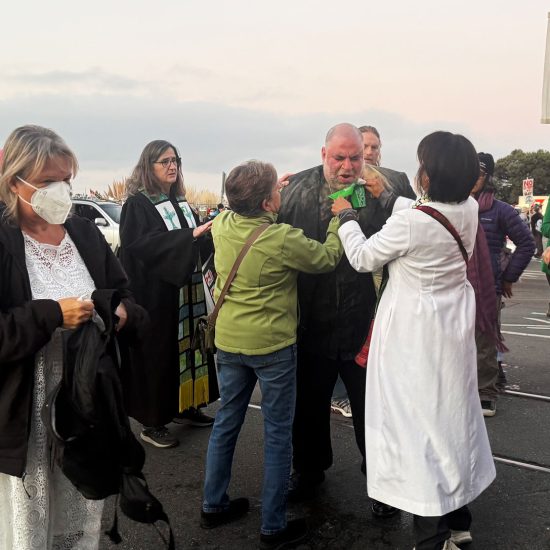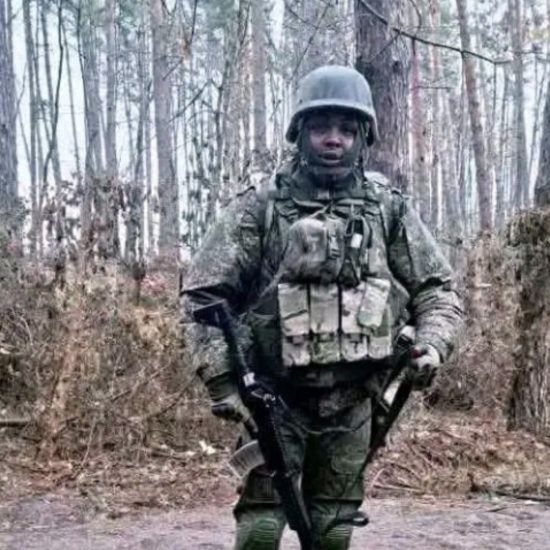
On Thursday (Aug. 21), a delegation of religious leaders in Arkansas gathered at the state Capitol in Little Rock to implore Gov. Sarah Huckabee Sanders not to resume state-sanctioned executions — specifically those using the method of gas asphyxiation. This plea comes after the state legislature passed a bill last session adding nitrogen gas as a new method for killing people who have been handed a death sentence. Arkansas has not executed anyone since 2017.

Screengrab of the Arkansas religious leaders gathered for a press conference
“We believe the death penalty denies the power of Christ to redeem, restore, and transform all human beings,” said Pastor Betsy Singleton-Snyder of Winfield United Methodist Church in her opening remarks. “We believe it is a violation of the sanctity of life, and contrary to the gospel of mercy and justice.”
She emphasized that this diverse group has gathered to speak with one voice due to deep concern over the direction their state is taking on this issue. Each leader opposes a largely untested method of execution that has yielded troubling results in the past. Instead, they call on their state to seek humane, restorative responses to crime.
“We ask you, governor, to reconsider and to listen not only to the medical evidence and research, but also to the moral and spiritual wisdom that guides so many of our communities. May compassion and justice prevail over cruelty and expedience,” Singleton-Snyder concluded.
Rev. Jacqui Buschor of Faith Lutheran Church then touched on the notion that nitrogen gas suffocation weaponizes the first gift God gives to every living being: our breath.
“We come before you now, grieving the violence of the world and the temptation to answer death with more death,” she prayed. “Forgive us God when we forget that every breath is holy. … Breathe upon this state a new vision, a vision of justice rooted in mercy, of life stronger than death, and of every person as an honored vessel of your sacred breath. And until that day comes, let us walk humbly with you and protect the gift of life you have given us all.”
Rev. Dr. Denise Donnell of New Beginnings Church of Central Arkansas touched on the racial aspects of the death penalty, noting that Black people are disproportionately represented on death row and special attention is often given to White victims.
“All of these reasons why we should not go forward with this are rooted in our inability to reckon with our racial relationships, and so that’s what I’m calling for us to do,” Donnell said. “What we need is to be willing to look each other in the eye and see God. And if I do that, there’s no way I would condemn them to death. It’s not possible. It’s impossible, in the name of my God.”
“As faith leaders, our traditions call us to be people who foster life, not create new and more insidious methods for putting people to death,” added Pastor Preston Clegg of Second Baptist Church of Little Rock. “The more we allow violence and torture to shape our moral imaginations, the more alien peacemaking becomes to us.”
Clegg spoke of the need to break the cycle of violence and death rather than perpetuate it: “Until we can learn to ask the question, ‘How can this be healed?’ not merely, ‘How can this be punished?’ we will continue to suffer because we can’t tell the difference.”
Other speakers included Rev. Paul Beedle of the Unitarian Universalist Church of Little Rock, Father Phillip Reeves of the Prison Ministry Office of the Diocese of Little Rock, and Rev. Dr. Hammett N. Evans of Methodist Family Health and the United Methodist Church of Arkansas.
After the remarks, religious leaders left to deliver a letter to Gov. Sanders signed by 40 Arkansas faith leaders from across the state, representing multiple religions and more than nine Christian denominations.
“Our call not to restart executions in our state is an expression of our desire to uphold a humane vision of seeking safety through acknowledging harm, repairing the harm as able, and changing society so the harm can’t happen again, which honors the sacred dignity of all people, including both victims and those who have caused immeasurable harm,” the letter reads. “Execution by means of gas suffocation is at odds with recognizing the inherent human dignity in every person.”





